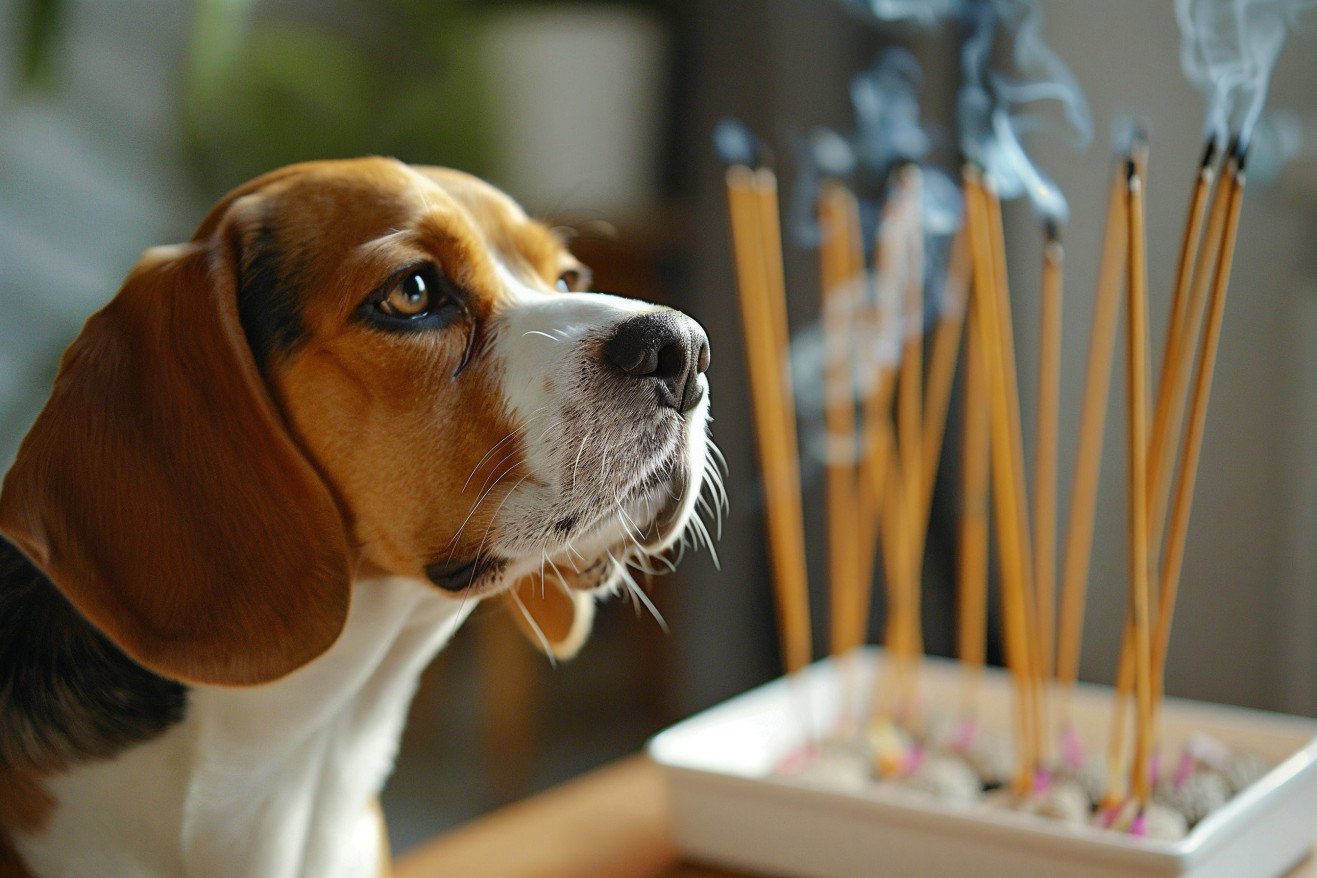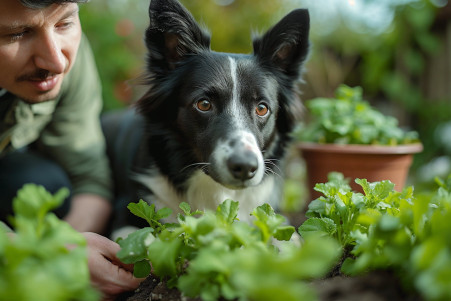Can Dogs Be Around Incense? What the Research Says
29 February 2024 • Updated 27 February 2024

Incense is often used to create a relaxing atmosphere in your home, but could it be negatively impacting your furry friend? Dogs can be affected by incense, especially since burning incense releases smoke and other chemicals that can lead to respiratory distress and other issues.
Dogs are especially at risk due to their sensitive noses and the fact that they often spend a lot of time indoors. As a result, many experts recommend that pet owners avoid burning incense if they have dogs.
To give you a complete understanding of this topic, we will be looking at information from veterinary research, toxicology studies, and even air quality investigations. By doing this, we can learn about the impact of incense on a dog’s respiratory health, as well as other potential health issues that may arise, including allergies.
We will also look at the different risks associated with different kinds of incense and explore some alternatives that can help you make sure your home smells great without putting your dog’s health in danger.
Can dogs be around incense?
What Science Says About Incense Smoke and Its Impact on Dogs
When incense is burned, it releases a complex mixture of particulate matter and volatile organic compounds (VOCs) into the air. A study in PMC showed that incense smoke contains many of the same harmful substances as cigarette smoke, including carcinogenic, mutagenic, and reprotoxic compounds, such as benzene, toluene, and formaldehyde. These substances are especially dangerous for dogs, who have a keen sense of smell and are close to the ground where the smoke settles.
Dogs that are exposed to incense smoke can suffer from a number of health problems. A study in PMC showed that incense smoke exposure is linked to respiratory issues and allergies in pets.
The same study also showed that dogs in homes that use incense are at a higher risk of developing respiratory diseases. This is especially worrisome because dogs have a more sensitive respiratory system than humans, which makes them more susceptible to the effects of inhaled toxins.
These studies show that incense smoke poses toxicological risks to dogs. Pet parents should be aware of these risks and take their dogs’ well-being into account when using incense. It’s also important to know the signs of exposure so that you can act quickly to minimize the risks and potential health effects.
How to Identify and Reduce the Immediate Risks of Incense to Dogs
Dogs can show immediate signs of irritation when they breathe in smoke or are exposed to the burning of incense. According to a study by Pawsafe, signs like watery eyes, coughing, and pawing at the nose are signs that dogs are uncomfortable around incense smoke.
Moreover, the reaction a dog has to incense can depend on the type of incense that is being used, with sandalwood potentially containing essential oils that are especially harmful to dogs.
The Environmental Protection Agency (EPA) has also warned that the particulate matter released by incense can significantly reduce the quality of the air in a home. For dogs, who have more sensitive respiratory systems, this can be an immediate issue that results in labored breathing or even acute respiratory distress, especially in dogs that are predisposed to respiratory issues.
If dog owners notice any signs of distress in their dogs, like shortness of breath or listlessness, they should stop using incense immediately and make sure that fresh air is circulating. To reduce the immediate risks, Incense Burn recommends that people make sure that they are burning incense in a well-ventilated area, use high-quality incense in moderation, and keep it away from pets to reduce the immediate risks.
In addition to the immediate risks, it’s also important for dog owners to think about the long-term risks that their pets may face if they are exposed to incense. If dogs are exposed to smoke on a regular basis, it could lead to chronic respiratory issues, which is why it’s important to be aware of the risks and consider switching to a dog-friendly option.
Chronic Respiratory Effects of Incense on Dogs
While incense can be a quick and easy way to make your home smell better, for dogs, the long-term effects of regular exposure can be much more serious and can lead to chronic respiratory problems.
Studies that PMC references show that incense smoke particulates can be inhaled deep into a dog’s respiratory system, which can cause chronic health problems like asthma and even lung cancer.
Both Green Matters and BluntPower Air Freshener explain that this is especially true for brachycephalic dogs, who have short muzzles and other facial characteristics that make them especially vulnerable to these issues. While these dogs are especially at risk, it’s important to note that they’re also especially at risk for respiratory problems in general.
While there are no specific rules or regulations in the pet industry about using incense around dogs, pet parents should take into account the growing body of evidence about the long-term risks of using incense. It’s important to make changes to safer practices, including making sure that you have good ventilation and using other methods to make your home smell better, to make sure that your dog stays healthy in the long run.
You can make your home smell good without putting your dog’s health at risk. By understanding the risks and making smart choices, you can make sure that your dog stays healthy in a home that smells good to both of you.
Making Your Home Dog-Friendly: Incense Substitutes
If you’re a dog parent who wants to keep your home smelling fresh but doesn’t want to take the risks associated with incense, there are safer alternatives like essential oil diffusers. That said, it’s important to make sure you’re using pet-safe options; the ASPCA notes that some essential oils can be toxic to pets, especially in their concentrated forms.
If you’re going to use diffusers, make sure they’re in a place your dog can’t reach and that you’re using a low enough concentration of oils that you’re not overwhelming your dog’s sensitive sense of smell.
Fi recommends using non-toxic methods that are good for the air like air purifiers with HEPA filters, which can help to clean the air of odors and airborne particles, which is especially good for dogs who live indoors.
In addition, the ASPCA points to a study that recommends Febreze as a pet-safe option for freshening the air. For a more natural option, you can also simmer pet-safe items like cinnamon sticks and citrus peels on the stove to create a warm scent without the negative effects of smoke.
To make sure you’re creating a healthy space for you and your dog, make sure you’re putting your dog’s health and well-being first when choosing and using home fragrances. With the right choices, you can create a pleasant and safe environment that also caters to your dog’s comfort.
How to Keep Dogs Safe from Incense
In summary, incense smoke, with its pleasant aroma, can also have serious health implications for dogs. Research from PubMed Central and information from Pets Best both show that particulate matter and toxic substances in incense smoke can lead to respiratory issues and other health problems in dogs. This is especially true because dogs are more sensitive to smells and are often exposed to incense smoke in enclosed spaces.
We hope that dog owners will think about their pets when they use scented products in their homes. As Utopia and Incense Burn point out, there are other, safer options, such as natural potpourri and pet-friendly essential oils, that can give off a nice scent without the potential dangers of incense smoke.
It’s important to find a way to enjoy scents while also keeping our pets safe. This means that we need to be careful about the products we bring into our homes and pay attention to how our dogs react to them.
It also means that we should be thoughtful about how we scent our homes. By continuing to learn and being mindful pet parents, we can make sure that our pets are safe and healthy and that they can enjoy their living spaces.


